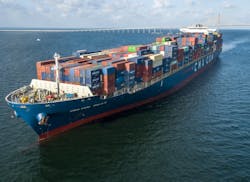French Shipping company creates $1.5B Energy Transition acceleration fund
French shipping company CMA CGM Group is creating a special fund for Energies, which will be backed by a five-year budget of $1.5 billion, to accelerate energy transition towards achieving the net-zero goal by 2050.
The fund will have four focus areas, namely: development and production of renewable fuels; decarbonization of port terminals, warehouses and truck fleet; trial and launch of innovations; and achieving energy savings and energy efficiency of employee working methods and daily mobility.
The fund will be managed by a team of group engineers, energy experts, project managers and financial analysts, starting in October.
"The CMA CGM Group has been acting to protect the environment for many years. It is at the heart of my convictions and of our strategy. However, in the face of the climate emergency it is our duty to do more and accelerate our actions,”
Rodolphe Saadé, Chairman and CEO of the CMA CGM Group, said. “This fund will enable us to make substantial investments in innovative projects to decarbonize our business. We have allocated the resources needed to accelerate our energy transition and that of the entire shipping and logistics industry.”
More Catches from the Sea by EnergyTech
Port of Long Beach joins Shanghai-Los Angeles Green Shipping Corridor
Carnival Cruise brand AIDA completes first Biofuel-powered Cruise
Subscribe to our free newsletter for regular Insights into the C&I Energy Transition
Under each focus area, some projects are already underway. For instance, the firm has already started using liquefied natural gas as maritime fuel and is working on the development and production of biofuels, biomethane, e-methane, carbon-free methanol, and other alternative fuels.
Some projects that have already been identified and launched are the Salamander Project, which will generate 11,000 tonnes of second-generation biomethane annually from 2026 in partnership with Engie. Another biomethane production and liquefaction project is underway with Titan to produce up to 100,000 tonnes by 2025 and double that by 2027. It is also working with a consortium led by GRTgaz to produce low-carbon e-methane for its ships.
As it accelerates the decarbonization around its approximately 50 port terminals, more than 700 warehouses and truck fleets worldwide, the firm is committed to achieve self-sufficiency in the supply of carbon-free electricity. CEVA Logistics, a CMA CGM subsidiary, intends to meet the firm’s electricity requirements through carbon-free power generation by 2025 that will involve the installation of 1.8 million sqm of photovoltaic panels and the use of LED lighting.
Port equipment will be electrified wherever possible and effective and CEVA Logistics trucks will be electrified.
Among the innovative projects underway is one being undertaken with the Energy Observer to make hydrogen one of its energy sources.
Under the Energy Observer 2 project, the members are developing a prototype intra-regional container ship, fueled by liquid hydrogen. The firm will also acquire a stake in Neoline, a prototype sail-powered cargo ship, which will operate on the transatlantic routes by the end of 2024.
